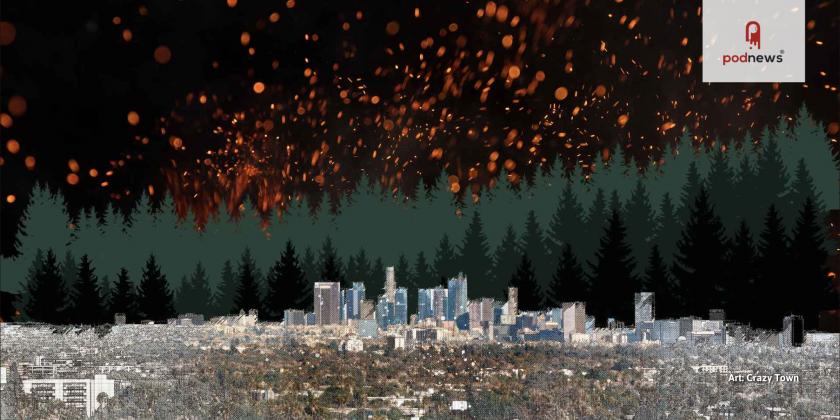
Eight Things I Learned Making a Podcast about How F*cked We Are

This article is at least a year old
Season 2 of Crazy Town launched on March 12th, 2020
You’ve got to be a little crazy to start a podcast these days. There are more than 500,000 podcasts out there. Seriously, 500,000! Let’s try to put that number in perspective. The worldwide population of podcasts is more than double the population of wild chimpanzees. Or try this… the number of podcasts is about the same as the number of days in 1,370 years! That probably means it would take you a lot longer than that to listen to all the available episodes floating around out there. But it turns out my colleagues and I are a little crazy – in fact that’s the premise of Crazy Town.
Jason Bradford and Asher Miller are my cohosts and co-producers on Crazy Town, and we’ve each been analyzing humanity’s overshoot crisis for the last 20 years or so. Collectively there are too many people consuming too much stuff in a fossil-fueled bonanza, and we’re undermining the life-support systems of the planet. On top of that, there are no easy answers for dialing things down. All three of us are affiliated with Post Carbon Institute, a nonprofit think tank where we routinely consider cheerful topics like the climate emergency, the unsustainability of fossil fuels, delusions about infinite economic growth on our finite planet, and the racial and wealth divide. Thankfully, it’s not all doom and gloom—we study resilience science and support the idea of building community resilience as a prosocial response to the interrelated crises of the 21st century.
When we considered the idea of making a podcast about our work, we knew we didn’t want to produce a show that was like existing ones. You can find plenty of thought-provoking shows with guest interviews and educational value, but most shows about humanity’s overshoot predicament aren’t much fun (sorry if that’s a spoiler for the doomers out there!). We were hoping to reach some audiences less well versed in these topics, and we wanted to see if we could lighten the mood while discussing some really distressing stuff, especially the question of why so few people are taking the predicament seriously.
We had to come up a steep learning curve to develop and release the inaugural season of Crazy Town, so I thought it might be useful to share some of our lessons learned. I’m not including technical lessons about podcasting, because there are a lot better resources than I can provide already available from reputable sources. So here are eight tips that might be worth considering for whomever wants to distribute the 500,002nd podcast:
- Find the balance between entertainment and substance. Not everyone resonates with our show’s humor, or my pop-culture-addled brain. And even though humor and banter are built into Crazy Town’s DNA, we had to remind ourselves that poop jokes and references to 80s movies probably won’t help people deal with environmental meltdown.
- Not all recordings are worthwhile, even some of the funny ones. It can be a great joy collaborating with creative colleagues. At times we made ourselves laugh to the point of abdominal pain, but some of the material that caused such outbreaks failed to make the cut because it didn’t strengthen the message of the episode. We realized we had to be ruthless in the editing process and accept that we’d be scrapping a lot of work we had done.
- If you’re authentic, chances are it’ll resonate with someone out there. We collected feedback with our website and a survey, and it was heartening to receive comments from listeners about how the show influenced their thinking and even how some listeners felt a kinship with my cohosts and me. Although I can’t be sure, I think it’s because we deliver useful information and make ourselves vulnerable by expressing genuine feelings.
- Build your show around a strong format. We had to do some rerecording when we realized that some of our first attempts rambled like the Allman brothers. Things went a lot better after we developed a format of four components that make up each episode. Having this format also helped us stick to our target length of 40 minutes per episode.
- If you’re going to put yourself in the public spotlight, be prepared. Our episodes mostly have the feel of an impromptu conversation, and although there’s plenty of spontaneity and improvisation, we made detailed outlines and notes for each show. Prior to recording sessions, we routinely scribbled all over a whiteboard to help us tell the cohesive story we wanted listeners to hear. Hmmm, now that I think about it, the inebriating effects of whiteboard marker off-gassing may have driven some of our giddier moments.
- Laughter can serve as an effective coping mechanism when facing tough topics. This statement is true not just for us, the hosts of the podcast, but also our listeners. We made a point of remaining playful even while considering existential threats to life on Earth. Sure, we all probably need to go through the five stages of grief (like I did last week when I accidentally dropped my ice cream cone in the dirt), but we’ve heard substantial appreciation for our willingness to bring humor to the heavy topics we cover.
- Being an inarticulate buffoon isn’t a fatal flaw. Almost everyone fumbles over their words, including the “brilliant” hosts of Crazy Town. We spent a lot of time editing our conversations. After 4,876 deletions of “you know” and “like,” we have hosts who sound like partial idiots, rather than complete idiots.
- Expect frustration as you try to get your podcast noticed in the crowded universe. If you’re like me, you might get pissed that shows hosted by celebrities grab the most listeners. It reminds me of when Madonna decided to write a children’s book. Why the hell does Madonna need to pull the rug out from under struggling children’s book authors? There’s not much you can do about it other than fume. It’s also frustrating to think about how popular some shows become, even though they focus on the most inane crap. Do we really need in-depth analysis about how medical treatment for some guy’s hernia will affect fantasy football teams?
There are undoubtedly dozens of other lessons, but my brain is too occupied with song lyrics from John Hughes movies to recall them now. I wish you all the best if you decide to make a podcast (unless you’re a celebrity who wants to discuss what kinds of cars other celebrities drive—if that’s the case, I wish you many years of blissful silence).

































































































